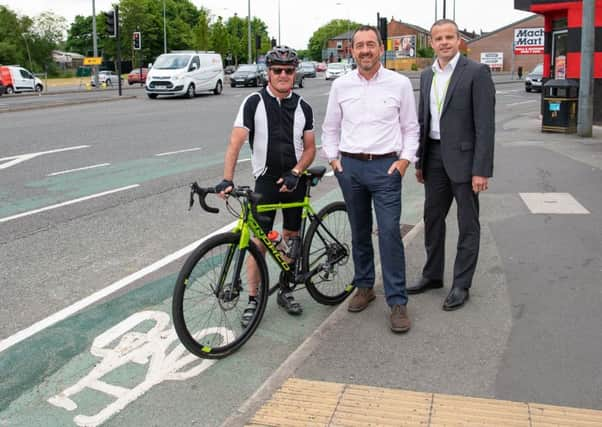Plans for 157 miles of new cycle routes in Wigan


Chris Boardman, Greater Manchester’s cycling and walking commissioner, teamed up with Wigan Council to unveil the ambitious new plan.
It is part of a proposal for the city region to create the UK’s biggest network for people travelling by bike or on foot.
Advertisement
Hide AdAdvertisement
Hide AdAs well as the new routes, 16 miles of Dutch-style segregated cycling lanes and 183 new or upgraded crossing points are proposed to better connect every community in the district and to make cycling and walking a real alternative to the car.
One “filtered neighbourhood” is also being proposed in Leigh town centre, where the movement of people is prioritised with places to sit, play and socialise.
The plans are part of a new 1,000-mile long network, named Beelines, which will be the largest joined-up network in the UK and has been developed with all of Greater Manchester’s 10 local authorities.
They are subject to formal approval by Greater Manchester Combined Authority on Friday.
Advertisement
Hide AdAdvertisement
Hide AdWigan Council leader David Molyneux said: “We’re committed to providing quality transport routes for commuters of all kind and putting resources into new cycling routes will encourage more people to get on their bikes.
“Walking or cycling shorter journeys will not only have health benefits, but it will improve air quality and relieve congestion on local roads.
“Partnership working with Transport for Greater Manchester (TfGM) and other local authorities in Greater Manchester is a paramount in delivering this fantastic project, which will provide even more links to neighbouring areas.”
Around 250 million car journeys of less than one kilometre are made per year in Greater Manchester: the equivalent of a 15-minute walk or five-minute bike ride. A large proportion are school runs.
Advertisement
Hide AdAdvertisement
Hide AdIn the Netherlands, 50 per cent of children bike to school every day.
In Greater Manchester the number is less than two per cent. Beelines aims to make walking and cycling the natural choice for short journeys.
Mayor Andy Burnham, said: “I have no doubt that Chris Boardman and Wigan Council will do us proud and make journeys on foot or by bike the first choice for local trips.
“This will help to tackle congestion and it will help to tackle poor air quality, as well as boosting people’s health and fitness levels.”
Advertisement
Hide AdAdvertisement
Hide AdMr Boardman, said: “I have been massively impressed by the political will of Wigan Council to come together to make this plan a reality.
“It’s not really about people using bikes and walking; it’s about making better places to live and work by giving normal people a real choice about how they travel. In doing so, we will make the city region healthier and more prosperous.”
Maps showing the proposed plans for each local authority were today published on TfGM’s website.
The proposed routes and crossing points have also been published on open data website mappinggm.org.uk, where members of the public can collaborate on plans for their area.
Advertisement
Hide AdAdvertisement
Hide AdThe plans represent the first draft of the network that could be expected to be delivered over the next four years. A second version will be published later in the year.
Mr Boardman said: “Planners, engineers and most importantly, local people in each district led on creating the first draft of these plans, which will evolve in the months and years ahead.
By involving local people from the very first stage, and enabling them to inform the details of each proposed route and crossing, we will get the outcome they need, not what we think they need.”
In March Mr Burnham allocated £160m of the Government’s Transforming Cities fund to the project which brings the total spend on cycling and walking in Greater Manchester to around £15 per head: a level seen in cities such as Copenhagen and Amsterdam.